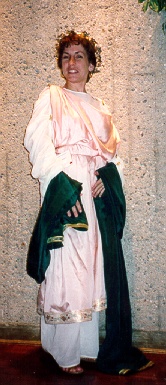Articles
I am sometimes asked about articles I've published (but not that often!). I thought it would be handy to post them here.
All articles are copyright and may NOT be reproduced elsewhere without EXPRESS PERMISSION.
- Lindsey Davis: An Interview with the Author of Silver Pigs.
- Fluent Latin
- A Ghost's Tale: Musings on the Film Scenario
- Just Charming: Tapping into the Latin Magic of Harry Potter
- Audiocassettes, Anyone?
- Twice a First Year Teacher
- Leafing Out: State Vice Presidents, the CPL and You
- Validating Spanish in the Latin Classroom
- Review: Tonight They All Dance
- Review: Arbor Alma: The Giving Tree in Latin
- Review: What Will I Eat? Quid Edam?
- Getting on Target: An Analysis of a Middle School Classroom
- Grammar and CLC: Keeping it in Context
- National Latin Teacher Recruitment Week: A Look Back
- CarPe Latinam: CPL's Tips for the Latin Classroom
- CarPe Latinam II
- CarPe Latinam III
- Survey Results from the 2nd Annual National Latin Teacher Recruitment Week
Review of Tonight They All Dance
SACRÉ, DIRK AND MARCEL SMETS, ED. TONIGHT THEY ALL DANCE. WAUCONDA, IL: BOLCHAZY-CARDUCCI PUBLISHERS, INC., 1999. PP 93. ISBN 086516440-1.
Tonight They All Dance is one of the most delightful books of Latin that has come along in the last decade. With secret pleasure I have kept it near my bedside for the past two years, rereading my favorite Latin haikus when I’m between novels. The foreward explains that Tonight They All Dance contains poems written by Harundine, a Belgian group of Latin haiku poets. The poetic English translations are by Herman Servotte.
The origin of the haikus in this slim, attractive volume is threefold: some are adaptations from classical verses, some are translations of Japanese haikus, and many are original verses. For those of us unfamiliar with haikus, the introduction clearly explains its structure (three lines with 5, 7, and 5 syllables, respectively) and spirit. Furthermore, we are reminded that a hexameter in its pure dactylic form is exactly 17 syllables, thus rendering it suitable in some respects for the haiku structure.
Following the introduction, there are the four main sections of haikus: Caelestia, Terrestria, Animalia and Humana. The last of these is followed by vocabulary and notes specific to each numbered poem, including the poem’s author and whether it was an adaptation from a passage originally written by a classical author. A complete glossary follows this section. The last two pages of the book contain a bibliography.
Tonight They All Dance as a whole is quite pleasing to the eye. Each pair of facing pages contains rarely more than two or three Latin haikus with matching English translations below or on the facing page. In the center of almost every page is a calligraphic drawing by Mark McIntyre, beautifully complementing the poems.
The following are a few of my favorites:
Oblitus est fur
in fenestrula mea
lunam splendentem.The burglar forgot
what stood high in my window:
the glimmering moon.
(p. 7)Cogitabunda
diu, tandem decidit
unica gutta.Taking time to think
at last it falls from the branch
this lonely droplet.
(p. 16)puellam prodit
in angulo latentem
risus venustus.The girl hiding
in a corner is betrayed
by her sweet laughter.
(p. 49)Hac nocte saltant
viri mulieresque
saltant et umbrae.Tonight they all dance
the men and the women and
their shadows as well.
(p. 63)
As these examples demonstrate, a haiku is “a poem as short as one breath” about “an apparently insignificant moment” which the author describes with empathy. The beauty of this book is that one can appreciate it thoroughly even if one’s knowledge of Latin is rusty or limited. Although some of the vocabulary will be new to most readers, all is easy to absorb and enjoy.
Without a doubt, this is my absolute favorite among all of Bolchazy-Carducci’s worthy books. I won’t say it is a must for your library, but I will emphatically state that it is a pleasure to have by one’s bedside.
copyright, Ginny Lindzey, 2002
May 26 , 2002
